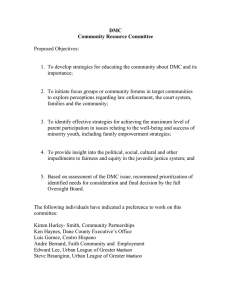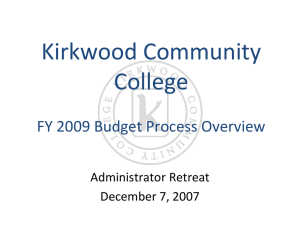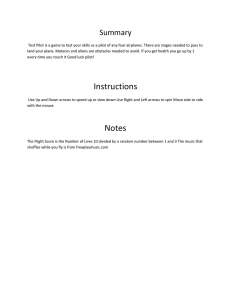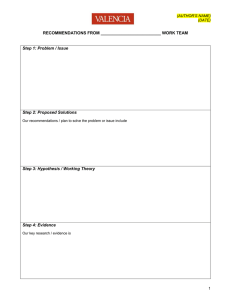Pilot Scheme on Enhancement of District Administration Through
advertisement
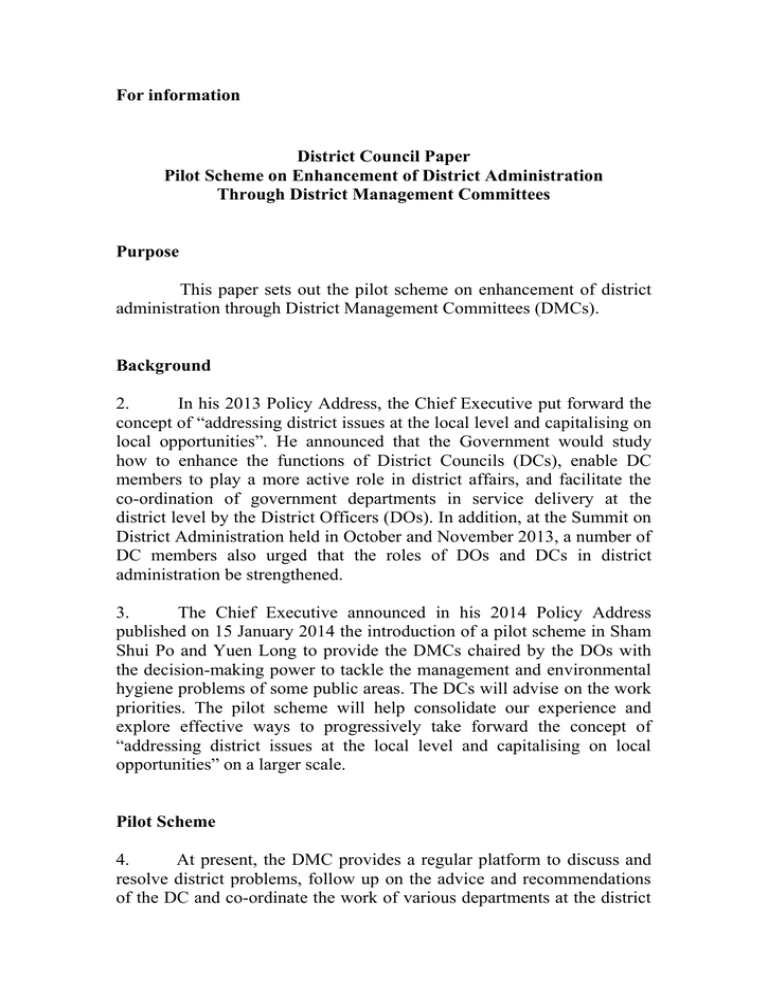
For information District Council Paper Pilot Scheme on Enhancement of District Administration Through District Management Committees Purpose This paper sets out the pilot scheme on enhancement of district administration through District Management Committees (DMCs). Background 2. In his 2013 Policy Address, the Chief Executive put forward the concept of “addressing district issues at the local level and capitalising on local opportunities”. He announced that the Government would study how to enhance the functions of District Councils (DCs), enable DC members to play a more active role in district affairs, and facilitate the co-ordination of government departments in service delivery at the district level by the District Officers (DOs). In addition, at the Summit on District Administration held in October and November 2013, a number of DC members also urged that the roles of DOs and DCs in district administration be strengthened. 3. The Chief Executive announced in his 2014 Policy Address published on 15 January 2014 the introduction of a pilot scheme in Sham Shui Po and Yuen Long to provide the DMCs chaired by the DOs with the decision-making power to tackle the management and environmental hygiene problems of some public areas. The DCs will advise on the work priorities. The pilot scheme will help consolidate our experience and explore effective ways to progressively take forward the concept of “addressing district issues at the local level and capitalising on local opportunities” on a larger scale. Pilot Scheme 4. At present, the DMC provides a regular platform to discuss and resolve district problems, follow up on the advice and recommendations of the DC and co-ordinate the work of various departments at the district level. The DMC is chaired by the DO and comprises DC Chairman and Vice-Chairman, Chairmen of committees under the DC, and district representatives of relevant departments. The DMC meets on a regular basis. The sample terms of reference and the list of government representatives of a typical DMC are set out at the Annex. 5. Although the DMC serves as an effective platform to facilitate efforts to tackle district problems, the priorities of the relevant bureaux/departments are not always aligned with the specific needs of a district as sometimes they may have different policy and other macro considerations or resources constraints. 6. The pilot scheme will facilitate the DMC to play a more active role in co-ordinating the work of various departments at the district level. Under the pilot scheme, the senior level of the Government will provide the DMC with the decision-making power to tackle the management and environmental hygiene problems of some public areas. The DMC will take into account the views of the DC concerned in the decision-making process. The DC will also advise on the work priorities. In other words, the DO and the DC will have a very important role to play in decision-making and co-ordination. The decisions of the DMC, including the work priorities, will be vigorously carried out by the relevant departments as far as practicable. District Problems to be Tackled under the Pilot Scheme 7. As mentioned in paragraph 3 above, the pilot scheme will provide the DMC with the decision-making power to tackle the management and environmental hygiene problems of some public areas. The DC will advise on the work priorities. The pilot scheme should focus on resolving localised issues that are capable of being addressed at the district level without any significant policy repercussions and territory-wide implications. According to this principle, there are issues that should not be pursued under the pilot scheme because of their wider policy and resource implications, such as matters under the Town Planning Ordinance, public works projects and related priorities etc. The DMC should not tackle law enforcement actions against crime or breach of peace/public safety/serious disruption to traffic or road users etc. The administrative measures taken in tackling district matters under the pilot scheme should not entail legislative changes. In addition, in line with the guiding principles adopted in the 2006 Review of the Role, Functions and Composition of District Councils in respect of the involvement of 2 DCs in the management of some district facilities, although Government departments should carry out the decisions of the DMC as far as practicable, any proposed measures of the DMC should not prejudice the statutory powers and obligations of the departments concerned and should be subject to the financial authority of the departments, relevant international professional and safety standards, prevailing government policies on staff and resource management (including government fees and charges). 8. We propose to implement the pilot scheme from April 2014 to August 2015. In view of the complexity of issues involved, two districts, one from the urban area and the other from the New Territories, are selected. Taking into account various considerations, such as population and the mix of old and new communities in the districts, the pilot scheme will be carried out in Sham Shui Po and Yuen Long. Sham Shui Po has both old buildings and new major residential developments (e.g. the so-called Four Little Dragons Neighbourhood in West Kowloon) while Yuen Long has both rural areas and new towns (e.g. Tin Shui Wai). Moreover, Sham Shui Po is a medium sized district with around 400 000 people and Yuen Long is a larger district with around 600 000 people. In overall terms, they have different district characteristics and a mix of different natures of district issues. The two districts are considered suitable for carrying out the pilot scheme, under which problems may be encountered in various aspects and solutions are to be tested. As regards the details of district matters to be tackled in the two districts under the pilot scheme, the relevant DOs will further discuss with their DCs. The DMCs will also report the progress of the pilot scheme to the DCs regularly. 9. Despite the fact that only Sham Shui Po and Yuen Long will be provided with additional resources and manpower, the Home Affairs Bureau (HAB) and the Home Affairs Department (HAD) will emphasise to other bureaux/departments that they should carry out the decisions of the DMCs as far as practicable in all districts. The HAD will make use of the monthly meetings of DC Chairmen/Vice-Chairmen as a platform to exchange views on a regular basis. Reporting Mechanism and Resources 10. The pilot scheme will strengthen the roles of the DO and the DC in handling district matters, so that district aspirations will be addressed and responded to more effectively. We will put in place a mechanism 3 whereby any failure of departments in implementing the decisions of the DMC will be escalated by the DO to the respective bureaux through HAB/HAD, and to the Offices of the Chief Secretary for Administration and the Chief Executive where necessary. The HAD will promulgate the details of the pilot scheme in a circular memorandum to bureaux and departments. 11. Some departments may face resource constraints in handling district problems. We will provide additional manpower and resources to the departments concerned for implementing the pilot scheme as necessary. Evaluation 12. At the mid-term and after the completion of the pilot scheme, having regard to operational experiences, we will review whether the pilot scheme has been smoothly implemented on the ground and whether it can be scaleable to other districts. Advice Sought 13. Members are invited to note the pilot scheme. Home Affairs Department January 2014 4 Annex District Management Committee Terms of Reference (Sample) The terms of reference of a District Management Committee (DMC) are :(a) to provide a forum for departments to discuss and resolve district problems; (b) to respond positively to the advice and requests of the District Council and to assist the Council to perform its role effectively; (c) to identify district needs, establish priorities between these needs and ensure that Government programmes are planned and implemented to meet the needs in time; (d) to co-ordinate departments’ activities and programmes in the management of district affairs, to maximise the utilisation of Government resources and ensure that full account is taken of the community needs; (e) to encourage and facilitate the participation of the residents in activities aimed at enhancing the residents’ sense of belonging to the community and improving the environment of the district; (f) to advise on the temporary use of vacant Government land; (g) to consider how best Government policies should be put into effect in the district taking into account its special circumstances; and (h) to submit a comprehensive written report to each meeting of the District Council on the work of the DMC, with a detailed account of the progress of follow up actions requested by the District Council. List of Government Representatives District Officer (Home Affairs Department) District Environmental Hygiene Superintendent (Food and Environmental Hygiene Department) District Leisure Manager (Leisure and Cultural Services Department) District Lands Officer (Lands Department) Chief / Senior Transport Officer (Transport Department) District Commander (Hong Kong Police Force) District Social Welfare Officer (Social Welfare Department) Chief / Senior Housing Manager (Housing Department) Chief Schools Development Officer (Education Bureau) Chief Engineer/Senior Engineer (Civil Engineering and Development Department) District Planning Officer (Planning Department) Chief Building Surveyor/Chief Structural Engineer (Buildings Department) 5
